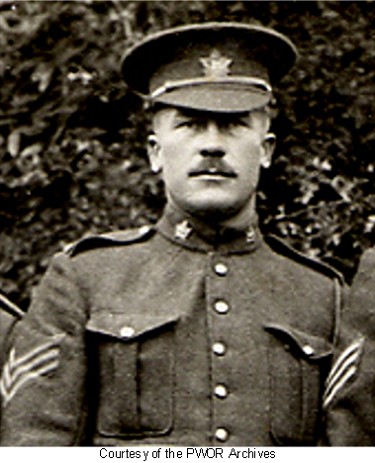|
Jan 22, 1884
|
Born in Renfrew County, Ontario to William and
Mary (nee Frivalt)
|
|
Oct 19, 1914
|
Shown on the payroll of the 42nd Lanark and Renfrew Regiment with the rank of
Private
|
|
Nov 6, 1914
|
Attested into the 21st Battalion in Kingston, Ontario
Ø Number 59871 (temporary number 1073)
Ø Next of kin given as William Seigel, father, Renfrew County,
Ontario
Ø Previous occupation given as Farmer
Ø Previous military experience given as 42nd Lanark and
Renfrew Regiment
Ø Religion given as Wesleyan
Ø Posted to “D” Company
o This was later reorganized into “B” Company
The 21st Battalion trained in the Kingston, Ontario
area through the winter of 1914-15.
|
|
Feb 19, 1915
|
Appointed to the position of Garrison Provost Sergeant
|
|
Apr 8, 1915
|
Admitted to the Queen Street Military Hospital in Kingston with
a diagnosis that reads Bronchitis
|
|
Apr 11, 1915
|
Discharged to duty from hospital
|
|
May 6, 1915
|
Embarked the RMS Metagama in Montreal, Quebec
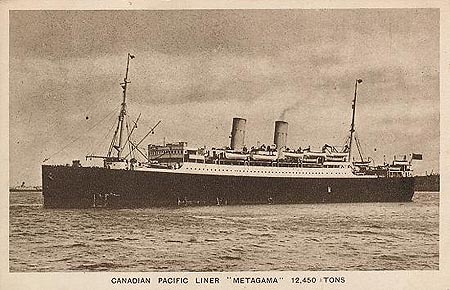
|
|
May 15, 1915
|
Disembarked in Devonport, England and the
battalion proceeded to the West Sandling Camp, near Hythe, Kent to continue
training
|
|
Sep 14, 1915
|
Embarked the St. Seiriol in Folkestone
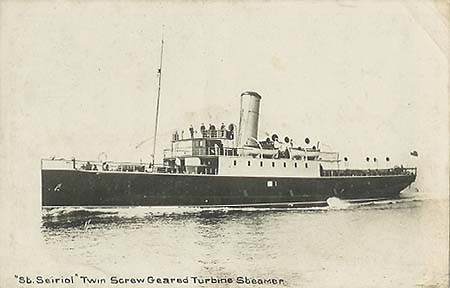
|
|
Sep 15, 1915
|
Disembarked in Boulogne, France and the battalion
proceeded to St. Omer
Reverted to the rank of Private
|
|
Sep 25, 1915
|
Admitted to the No. 6 CFA (Canadian Field
Ambulance) with a diagnosis that reads Orchitis
|
|
Oct 3, 1915
|
Transferred to the Division Rest Station
|
|
Oct 6, 1915
|
Transferred to the North Midland Division
Casualty Clearing Station in Mont des Cats, France and the diagnosis was
changed to read Epididymitis
|
|
Oct 9, 1915
|
Discharged to duty from the casualty clearing
station and rejoined the 21st Battalion in La Clytte, Belgium
|
|
Dec 8, 1915
|
Appointed to the rank of Lance Corporal with pay
|
|
Jan 11, 1916
|
Promoted to the rank of Corporal
|
|
Apr 9, 1916
|
When he was partially buried by a shell explosion
during fighting at the St. Eloi Craters in Belgium, Corporal Seigel had his
left knee bent sideways to the point that the ligaments and tendons were
stretched and torn to the point of him being unable to walk. He was evacuated to the No. 10 CCS
(Casualty Clearing Station) before being loaded on the No. 23 AT (Ambulance
Train). He was then transported to the
No. 3 Canadian General Hospital in Boulogne, France
|
|
Apr 28, 1916
|
Invalided to England aboard the Hospital Ship
Newhaven
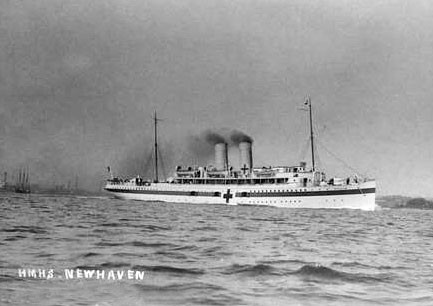
On arrival in England, he was admitted to the
Edmonton Military Hospital in Edmonton, north London
Transferred to the CCAC (Canadian Casualty
Assembly Centre) for pay purposes
|
|
Jun 2, 1916
|
Surgery was performed to repair ligament and
tendon damage
|
|
Aug 8, 1916
|
Transferred to the Military Convalescent
Hospital, Woodcote Park, Epsom
|
|
Aug 31, 1916
|
Discharged from hospital and attached to the 39th
Reserve Battalion in West Sandling for light duties
|
|
Oct 10, 1916
|
Medical Board notes
Ø There is extensive damage to
ligaments and tendons of left knee due to being bent sideways when a shell
exploded near him and caved in the trench wall
Ø Man walks with a cane and must
wear a “mechanical device” around his left knee
Ø His knee gives way if he does
not wear the brace
Ø Board recommends that he
discharged from service as medically unfit
|
|
Nov 3, 1916
|
Reported to the Canadian Casualty Assembly Centre
in West Sandling
|
|
Nov 4, 1916
|
Attached to the CDD (Canadian Discharge Depot) in
Buxton pending return to Canada
|
|
Nov 17, 1916
|
Embarked the SS Corsican in Liverpool
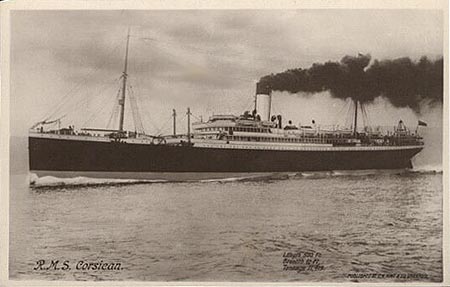
|
|
Nov 27, 1916
|
Disembarked in Saint John, New Brunswick and
proceeded to Kingston, Ontario
|
|
Dec 3, 1916
|
Admitted to the Elmhurst Military Convalescent
Home in Kingston
|
|
Mar 6, 1917
|
To be treated as an Out Patient of the Elmhurst
Convalescent Home
|
|
Mar 8, 1917
|
Admitted to the Elmhurst Convalescent Home as an
In Patient
|
|
May 16, 1917
|
Transferred to the Fettercairn Convalescent Home
north of Kingston
|
|
Jun 2, 1917
|
Transferred to the Elmhurst Convalescent Home as
an In Patient
|
|
Jun 15, 1917
|
To be treated as an Out Patient of the Elmhurst
Convalescent Home
|
|
Jun 18, 1917
|
Medical exam in Kingston notes that the patient
suffers from DAH (Disordered Activity of the Heart). He suffers from slight dizzy spells and had
an irregular heart beat
|
|
Aug 31, 1917
|
Discharged from the CEF in Kingston, Ontario
Ø Rank on discharge Corporal
Ø Entitled to War Service Badge
Class “A”
Ø Proposed residence on
discharge, Cobden, Ontario
Following the end of the war, the 1914-15 Star,
British War Medal and Victory Medals were sent to him at Miles and Centre
St., Cartier, Ontario
|
|
Jun 5, 1918
|
Married to Mary Louise Lemke in Pembroke, Ontario
|
|
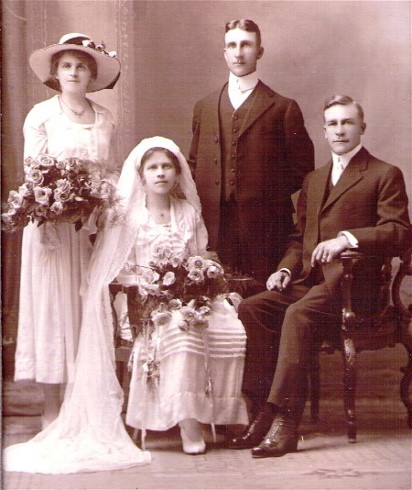
|
|
May 25, 1925
|
John Seigel was fatally injured by a train
locomotive in the Canadian Pacific Railway Yard in Cartier, Ontario and he
died shortly after in hospital. He was
later buried in the Zion United Cemetery, Laurentian Valley Twp, Renfrew
County
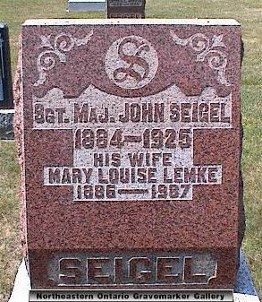
|
|
